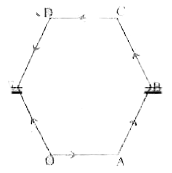Given that →a.→b=0 and →a×→b=→0. What can you conclude about the vectors →a and →b?Solution in Tamil
The correct Answer is:→a⊥→b and →a∣∣→b are not possible at the same time.
Step by step video, text & image solution for Given that vec a. vec b = 0 and vec a xx vec b = vec 0. What can you conclude about the vectors veca and vec b? by Maths experts to help you in doubts & scoring excellent marks in Class 12 exams.
Updated on:21/07/2023Topper's Solved these Questions
- VECTOR ALGEBRABook:NEW JOYTHI PUBLICATIONChapter:VECTOR ALGEBRAExercise:ADDITIONAL QUESTIONS FOR PRACTICE 10.1
Explore 2 Videos
- VECTOR ALGEBRABook:NEW JOYTHI PUBLICATIONChapter:VECTOR ALGEBRAExercise:ADDITIONAL QUESTIONS FOR PRACTICE 10.2
Explore 13 Videos
- VECTOR ALGEBRABook:NEW JOYTHI PUBLICATIONChapter:VECTOR ALGEBRAExercise:SOLUTIONS TO NCERT TEXT BOOK EXERCISE 10.3
Explore 18 Videos
- TRIGONOMETRIC FUNCTIONSBook:NEW JOYTHI PUBLICATIONChapter:TRIGONOMETRIC FUNCTIONSExercise:QUESTIONS FROM COMPETITIVE EXAMS
Explore 134 Videos
Similar Questions
In the figure which vectors are
(i) equal (ii) collinear (iii) coinitial

View SolutionCompute the magnitude of the following vectors and identify the unit vector.
→a=2ˆi−3ˆj+5ˆk
View SolutionFind the angle between two vectors →a and →b with magnitudes √3 and 2, respectivey having →a.→b=√6.
View SolutionIf A+B+C=90∘ then
cotA+cotB+cotCcotAcotBcotC =
View SolutionGiven that →a.→b=0and →a×→b=0. What can you conclude about the vectors →aand →b.
View SolutionIf →a . →a=0 and →a . →b=0, then what can be concluded about the vector →b ?
View SolutionIf →a.→a=0 and →a.→b=0, what can you conclude about the vector →b?
View SolutionIf →a.→a=0 and →a.→b=0 what casn you conclude about the vector →b?
View SolutionIf →a.→a.=0 and →a.→b=0 what can you conclude about the vector →b?
View Solutionयदि →a⋅→b=0 और →a×→b=0 तो, सदिश →a और →b के बारे में आप क्या निष्कर्ष निकल सकते हैं ?
View SolutionProve that for any two vectors →a and →b,→a.(→a×→b)=0. Is →b.(→a×→b)=0 ?
View SolutionWhat can you conclude about four non - zero vectors →a,→b,→c and →d, given that : [(→a×→b).→c]+[(→b×→c).→d]=0 ?
View SolutionIf →a.→a=0 and →a.→b=0 the what can be concluded about the vector →b?
View SolutionGiven that →a.→b=0and →a×→b=0. What can you conclude about the vectors →aand →b.
View SolutionIf →a . →a=0 and →a .→b=0, then what can be concluded about the vector →b ?
View SolutionIf →a.→a=0 and →a.→b=0, what can you conclude about the vector →b?
View Solution
